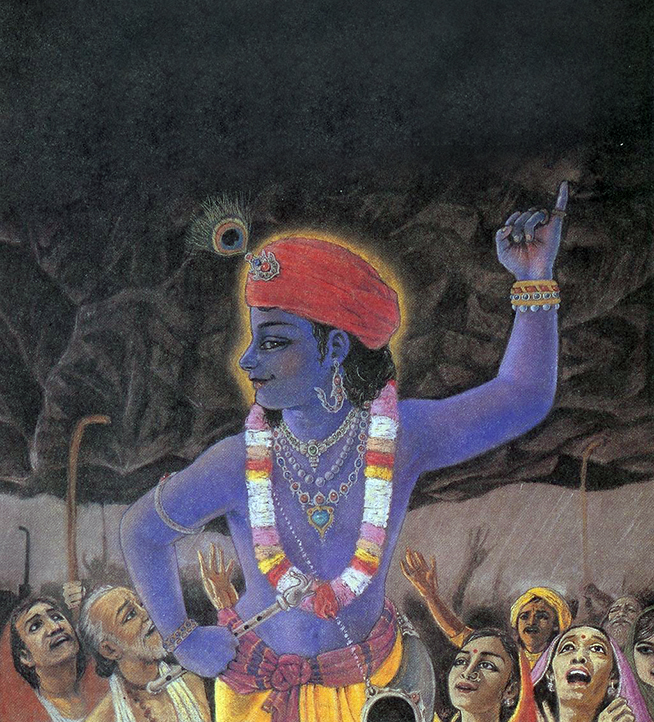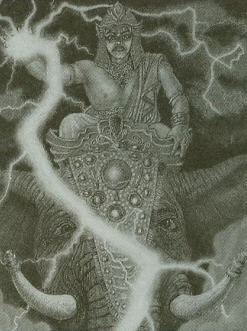This September, Lord Krsna's devotees celebrate His birthday.
Like everything else about Krsna, His birth is nothing ordinary.

IT IS NOT POSSIBLE for an ordinary living entity to compare to Krsna. From the very beginning of His pastimes here on earth, more than 5,200 years ago, Krsna displayed His superiority over everyone. Once, when Krsna was lying peacefully on His bed like a small baby dependent on his mother, a cruel witch named Putana approached with a plan to kill Him. Putana was by nature ugly, but by mystic power she had transformed her large, grotesque body into that of a beautiful woman.
She was so beautiful that although she was heading straight for the place where Krsna lay, Krsna's mother, Yasoda, did not think to stop her. Putana looked harmless and seemed simply to want to nurse the child, but she had smeared poison on her breast and was planning to kill Him when He sucked her milk. But this plan was not to be fulfilled. Baby Krsna accepted the breast coated with poison and sucked the milk and also the witch's life air, killing her immediately.
God does not have to become God by mystic practice. Some pseudo transcendentalists say that although we are not God at present, we can become God through a carefully contrived series of physical and mental exercises. They think that after some time, say six months or a year, they will realize their position as the Supreme.
This is foolish. No one is greater than God, and no one is equal to Him. He is always God, and one who is not God now can never become God, despite careful practice of mystic yoga for millions of years.
When Putana approached Krsna, He was lying on His bed like a small, helpless baby. Yet He was fully aware of what was happening around Him, and He was fully competent to kill the demon who had come to kill Him. He did not have to perform austerities and penances to get His power, for it was naturally present within His transcendental form.
We can understand the difference between Krsna and an ordinary living being simply by considering Krsna's birth. An ordinary being is born by the seminal discharge of a father into the womb of a mother. The embryo grows and then takes birth tied to his mother with an umbilical cord and coated in a slimy liquid. Slapped on the rear by the doctor, he starts his life crying.
Krsna does not take birth like this. At the moment of His birth, He showed His four-armed Narayana form to His parents. He stood before them with beautiful flowing black hair, a shining crown, a jeweled necklace of kaustubha stone, valuable bracelets, earrings, and similar ornaments. He held a conchshell, club, lotus, and disc in His four hands, and He was dressed in yellow silk. The jewels and clothes on His transcendental body made Him look dazzling, like a bright blackish cloud.
Thus the birth of an ordinary child cannot compare to Krsna's. Indeed, His father and mother, Vasudeva and Devaki, could hardly believe their eyes on seeing His wondrous form of transcendental bliss.
Throughout Krsna's pastimes during the more than 125 years He stayed on earth, we find the recurrent theme of inconceivable action. Just consider His lifting Govardhana Hill. Krsna had managed to anger King Indra, the demigod in charge of rain, by stopping a sacrifice meant to satisfy him. Krsna wanted to cut down Indra's excessive pride, so He specifically used words sure to upset Indra and invoke his wrath on the inhabitants of Vrndavana.
As Indra's wrath arose, he poured down rain, hail, and pieces of ice as if bringing about the final devastation of the world. The cows and cowherd men and women of Vrndavana approached Krsna pleading for protecton. Krsna, manifesting His supremely powerful mystic potencies, simply placed His hand under a mountain known as Govardhana Hill and lifted it straight off the ground into the air. He held the mountain like an umbrella on the little finger of His left hand for seven days, while Indra futilely tried to destroy the inhabitants of Vrndavana.
Who can lift a mountain? Who can even lift a piece of paper and hold it up for more than an hour, what to speak of seven days? Yet Krsna did this wonderful feat without the slightest sign of fatigue. Who can compare to the Personality of Godhead? Yet although Krsna is so great, worldly intellectuals try to reduce Him to the level of an ordinary historical personality.
Which historical personality could marry 16,108 princesses simultaneously in 16,108 palaces? Yet Krsna did, with all conceivable pomp and ceremony. Normally no one can expand himself into other forms, for we are all bound to the one form of our body. But Krsna can expand Himself into innumerable forms each one acting differently. This is the supreme mystic opulence of the Supreme Person.
Once Narada Muni, a great wandering sage among the demigods, wanted to see what Krsna was doing in each of His 16,108 palaces. Narada entered the first palace and saw Krsna being fanned by His principal queen, Rukmini. Leaving that palace, Narada entered the next and saw Krsna playing with His children just like an affectionate father. In the next palace he saw Krsna preparing to bathe. Moving from one palace to another, Narada saw that Krsna was engaged in different activities in each of His 16,108 palaces. Only the Supreme Lord could display such varied pastimes simultaneously.
The conclusion is simple. Krsna is the Supreme Personality of Godhead, who performs unlimited, inconceivable pastimes while on earth. Although people may want to bring many other persons forward as God, their candidates cannot compare in the slightest to Krsna. Therefore we worship the Supreme Absolute Truth, Lord Sri Krsna, the one without a second, and we are satisfied chanting His holy name: Hare Krsna.
Harikesa Swami is a member of ISKCON's governing body commission with responsibilities in India and Europe. He is also a trustee of the Bhaktivedanta Book Trust, overseeing the publication and distribution of Srila Prabhupada's books in many European languages.

